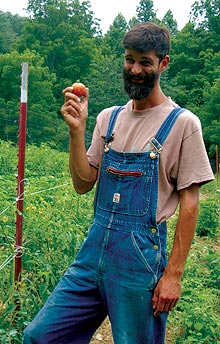With spring now in full bloom, it’s time to make the transition to longer, sunnier days by putting winter daydreams into action and planning for the productive season.

One of the most exciting things to look forward to at this time of year is the steadily increasing supply of fresh, local produce. Soon we’ll be seeing wider offerings in local stores, getting up early again on Saturday mornings to hit the tailgate market, and savoring the first succulent fruits of 2008.
But at this point, most of those markets aren’t open yet, and root vegetables are just about the only local produce available. What’s an itchy local eater to do?
One great way to get a jump on this year’s harvest is to join a CSA. By entering into a binding agreement with a local farmer before the harvest starts and making one up-front payment, you’re ensured a steady supply of the freshest, ripest products of the farm, all season long. On average, CSA farmers in Western North Carolina provide their members with a three-quarter-bushel box of fresh produce once a week. And once you’ve paid your membership fee, no additional money changes hands.
There are plenty of benefits to being in a CSA, both on the production and the consumption ends. For farmers, the CSA income arrives at the start of the season, when most of the input costs of farming (for things like seeds and early season labor) are incurred. As Annie Louise Perkinson of Flying Cloud Farm in Fairview explains: “The CSA provides our ‘seed money,’ just like a nonprofit would get a grant of seed money to get started. This literally gives us the resources to buy seeds and get the season started.” In addition, the arrangement gives farmers a ready market they can count on throughout the season.
For consumers, the most obvious benefit is the weekly arrival of abundant fresh, locally grown vegetables that escort the eager recipient through all the delicious twists and turns of seasonal Appalachian eating. A CSA member doesn’t miss a single feature of the growing season, and the produce is harvested and delivered at peak ripeness.
“If we have any complaint from our CSA customers, it’s that we give too much food,” says Glenda Ploeger of Cane Creek Asparagus & Co. in Fairview.
Carl Evans of Mountain Harvest Organics in Hot Springs echoes that sentiment, saying, “We hear frequently that there’s too much food in the boxes.”
But if this can be considered a drawback of CSA membership, it’s also the impetus for one of the system’s biggest benefits: learning how to cook and eat seasonally, often with produce that isn’t usually seen in grocery stores.
“People ask me all the time when they come to pick up their vegetables, ‘What do I do with this?’ ” says Ronald Arps of Vegenui Garden in Sylva. “I’m always happy to give them some ideas of how we like to use our vegetables, or some creative ways of cooking unfamiliar varieties.”
“A huge part of a CSA is education—about foods and cooking, and about what’s going on at the farm,” Perkinson agrees.
Anne Grier of Gaining Ground Farm in Asheville adds: “A lot of CSA customers seem to be really eager to learn about food. I even have some customers that are families where the older kids are trying to get the parents into eating more fresh foods.”
Most CSA farms offer one or two rendezvous points where customers can collect their weekly allotment. Some encourage customers to come to them, but others make tailored deliveries or offer pickup at a centrally located market.
And though CSAs aren’t exactly new to Western North Carolina, Peter Marks of the Appalachian Sustainable Agriculture Project, which produces an annual Local Food Guide listing CSAs in the area, notes that the past few years have seen a rise in the number of local programs, especially outside the immediate Asheville area. With that increase has come a diversity of approaches; one farm lets members choose the produce they receive each week, and a few collect payments weekly, rather than at the start of the season. Moretz’s Mountain Orchard, near Boone, offers an apple CSA; Gaining Ground provides a meat CSA; and both Green Toe Ground Farm in Burnsville and Flying Cloud Farm say they plan to offer winter shares this year, so eaters can feast on fresh salad greens and root vegetables well into February.
At the heart of these diverse schemes are the words that define them all: Community, support and agriculture describe a unique arrangement whereby a unified community of eaters gives seasonal support to their local agriculture.
“It also goes the other way, you know,” observes Frank Teneralli of Let It Grow Organic Gardens in Spring Creek. “I have CSA customers that get together every week and make dinner together with the contents of their boxes from the farm. In that way, it’s really agriculture supporting community.”
[Asheville resident Ginger Kowal is a UNCA senior majoring in biology.]
How to join
Many mountain CSAs, including some of the ones mentioned in this article, are still accepting new members for 2008. To find out more, check out the Local Food Guide, in print or online (www.AppalachianGrown.org). To look up CSAs nationwide, go to www.localharvest.org.



Wow! Winter CSA shares, how exciting!